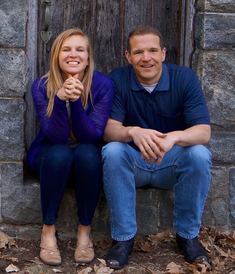
I came into the weekend caught up in my daily grind. We have six foster children, four of those ranging in age from four to four months. I change diapers, kiss plenty of owwies, and put together Mr. Potato Head ten times before noon. I juggle homework, play dates, random appointments, and cooking dinner every afternoon.
They asked us to draw pictures of who we are and I quickly scribbled a face with frazzled hair, a smile, cross eyes, and balls flying through the air. After three days at the conference, I’m pulled in just as many directions, but I came away reaffirmed that foster parenting is worth making a priority in our life, and here’s why.
Relationships matter.
A big chunk of the conference devoted thoughtful attention to vital relationships. People are eternal and made for community with one another.
When we decided to become foster parents, we knew we would develop sweet relationships with children. Now we see relationships with many people are deeper as a result of foster parenting. If you’re a foster parent, I imagine you can relate.
First, the parenting relationship we’ve shared with foster children is extremely precious. Taking part in a child’s life change from floundering to flourishing brings nothing short of joy. Relating to the children has been the most gratifying ‘work’ I’ve completed.
But foster parenting has also brought purposeful, flourishing relationships with others in the community—birth parents and case managers, our church, neighbors, our parents, therapists and teachers. We absolutely depend on other people who have helped meet our physical and emotional needs, who engage with each new child to make them feel settled, and who work diligently with children’s special needs. TJ and I are both more of an independent nature and it’s hard to ask for help, but foster parenting has brought an acute need for others, which has resulted in a grateful heart and many friendships.
I feel relationally rich because of foster children opening the doors of our lives.
Foster parenting brings significance.
Professionals who reach financial stability usually choose to transition their career focus into building either surplus or significance. Much of the life coaching tried to help attendees find what activity could bring them significance. They would give us fifteen or twenty minutes to brainstorm or check through lists. For TJ and I, the answer always came easily—foster parenting.
It’s not that everyday I feel significant in foster parenting. Changing diapers and scheduling a dozen appointments a month doesn’t feel glamorous. But when I filled in a life map by identifying memories such as significant people, joys and pains, shaping moments, and obstacles overcome, I felt like I could just take a bold marker across the last decade and pen “foster parenting.” Engaging with these utterly dependent children to provide safety and well-being gives my days value.
I can handle the risk.
Several of the workshops built up to creating a personal mission statement. First, we identified our strengths in our personality, experiences, abilities, and spiritual gifts. Then, we highlighted opportunities before us such as issues, passions or people groups. Together, these formed a purpose for individuals to envision a desired outcome.
One of the causes I circled was ‘at-risk children.’ Foster children are poster children for the term “at-risk.” In fact, by definition a state official must determine the child faces continued significant risk in order for the child to enter foster care. The workbook framed issues such as at-risk children, as opportunities.
Then I had to answer the question, “How do I respond to opportunities?” High or low risk? People or projects? Routine or variety? And more. As I circled statements such as “I can handle change,” “I thrive in chaotic environments,” and “I have motivation to overcome obstacles,” something clicked. The pairing of my own tolerance for risk, and the labeling of children as at-risk really rang within me. Foster children are facing change, coming from chaos, and facing obstacles.
So I ended up drafting this as my personal mission statement:
I am trusting God to use my faith and discernment to communicate and connect with foster children so that risk is transferred off the vulnerable onto me.
And isn’t risk transfer what happens? My thoughts become more full of questions of how to handle xyz, my home becomes messier, my emotions get wound up. I feel the uncertainty. I mitigate their risk so they can rest from it. And by faith, I can handle it.
These points aren’t unique to me.
Everyone is built up by connecting in relationships, everyone longs for a sense of significance, and if you’re reading this, you likely have the stability in life that can handle more risk.
If you’re involved in the lives of foster children I hope these takeaways remind you that what you’re doing makes a difference—because when we step on a Lego in the middle of the night on the way to a crying baby or hear a teenager respond “whatever” to a simple question, it can feel trivial.
If you’re not involved with foster children and feel like your life could hold more relationships, more significance, and more risk (like Legos on the floor!) then I would encourage you to take the first step today. Have faith to foster. The children are worth it. You have abilities, gifts, and experiences that equip you for foster parenting.
Jenn and TJ Menn have welcomed twenty-four foster children into their home from multiple states across America. TJ is a graduate of the United States Military Academy at West Point where he serves as an Aviation Officer in the United States Army, and also teaches economics at West Point. Jenn graduated from Trinity College of the Bible and is a certified member of the Association of Certified Biblical Counselors. Jenn and TJ Menn are the authors of Faith to Foster.


 RSS Feed
RSS Feed